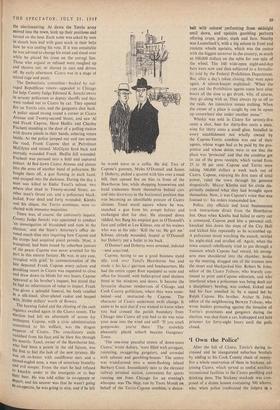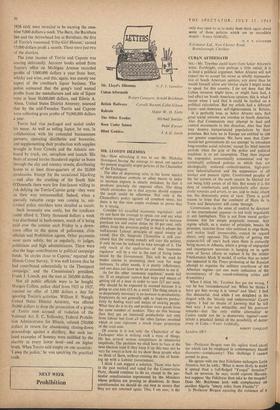Own the Police'
After he fall of Cicero, Torrio's daring in- creased and he inaugurated suburban brothels by adding to his Cook County chain of twenty- five a whole reservation of them in Stickney, ad- joining Cicero, which served as useful auxiliary recreational facilities to the Cicero gambling and drinking dens. The Stickney stockade was com- posed of a dozen houses containing 500 whores, who, when police confiscated the ledgers in a 1926 raid, were revealed to be earning the com- bine 5,000 dollars a week. The Barn, the Burnham Inn and the Arrowhead Inn at Burnham, the first of Torrio's renowned 'Fifty-Girl Houses,' earned 15,000 dollars profit a month. These were just two of the districts.
The joint income of Torrio and Capone was soaring deliriously. Account books seized from Torrio's office on Michigan Avenue recorded profits of 3,000,000 dollars a year from beer, whisky and wine, and this, again, was merely one aspect of the combine's liquor business. The police estimated that the gang's total annual profits from the manufacture and sale of liquor were at least 30,000,000 dollars, and Edwin A. Alson, United States District Attorney, assessed that by the mid-Twenties Torrio and Capone were collecting gross profits of 70,000,000 dollars a year.
Torrio had vice packaged and sealed under his name. As well as selling liquor, he was, in collaboration with his concealed businessmen partners, operating distilleries and breweries, and supplementing their production with supplies brought in from Canada and the Atlantic sea- board by truck, car, aeroplane and launch. His fleets of armed lorries thundered regular as buses through the city and country streets, distributing booze to at least three-quarters of the 20,000 speakeasies. Except for the occasional hijacking —and after the crushing of the South Side O'Donnells there were few free-lances willing to risk defying the Torrio-Capone gang—they went on their way untrammelled. Indeed, when a specially valuable cargo was coming in, uni- formed police outriders were detailed as escort.
Such immunity was costly, but the syndicate could afford it. Thirty thousand dollars a week was distributed in hush-money, much of it being paid over the counter each Friday in a down- town office to the queue of policemen, civic officials and Prohibition agents. Other payments went more subtly, but as regularly, to judges, politicians and high administrators. There were also the huge contributions to political campaign funds. 'In circles close to Capone,' reported the Illinois Crime Survey, 'it was well known that he had contributed substantially to the Thompson campaign,' and the Commission's president, Frank J. Loesch, put the sum at 260,000 dollars.
Not all public officials were to be bought. Morgan Collins, police chief from 1923 to 1927, rejected an offer of 1,000 dollars a day for ignoring Torrio's activities. William F. Waugh, United States District Attorney, was offered 50,000 dollars to drop the prosecution of a group of Torrio men accused of violation of the Volstead Act. E. C. Yellowley, Federal Prohibi- tion Administrator for Illinois, refused 250,000 dollars in return for abandoning closing-down proceedings against a distillery. But such iso- lated examples of honesty were nullified by the alacrity at every lower level—and on higher levels. When Torrio said simply on one occasion: 'I own the Police,' he was speaking the practical t ruth.



















































 Previous page
Previous page